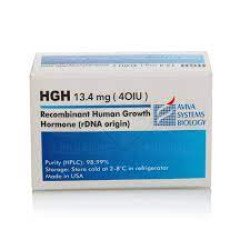Human Growth Hormone by Aviva is a proteinaceous hormone made up of a chain of 191 amino acids and is produced by the pituitary gland. It is responsible for the protein deposition, growth of tissues, and the breakdown of subcutaneous fat stores. Human Growth Hormone is produced in its highest levels during adolescence, as should be no surprise since this is when the majority of a person's body growth occurs. In adulthood, growth hormone still circulates in the body but at much lower levels. The primary medical purpose for administration of human growth hormone is for those that suffer from a deficiency of the hormone during their adolescence so that normal growth can occur. However in recent years the popularity of HGH has surged as a means to treat age-related degenerative conditions, as well as other so-called "anti-aging" therapies.
HGH first became available in the 1980's. At first it was extracted from the pituitary glands of cadavers. This practice was discontinued however when it was determined that administration of the hormone that was collected this way was linked to the spread of a fatal brain disease. All of the human growth hormone that is now produced is synthetic.
In terms of the use of HGH for strength athletes and bodybuilders, the effects are two fold. First, it has been demonstrated that consistent administration of Hygetropin (HGH) can help to promote loss of body fat. In part this is due to the ability of the compound to cause cells in the body to increase the rate with which they utilize fats while also decreasing the rate that carbohydrates are used. This fat loss is achieved because of the ability of Growth Hormone to stimulate triglyceride hydrolysis in adipose tissue as well.
In conjunction with this, Human Growth Hormone helps to promote the movement of amino acids through cell membranes. This, along with the fact that growth hormone promotes the growth of the cells in the body and increases the rate at which these cells divide and multiple, obviously indicates that it is also capable of enhancing anabolism if used at appropriate doses.
Many users also have an interest in using HGH for the ability of the compound to help heal existing injuries and prevent new ones from occurring. There is some evidence that Growth Hormone can help to promote the production of new and regeneration of damaged cartilage when used in conjunction with insulin-like growth factor. It is actually the insulin-like growth factor that stimulates the production of cartilage. Insulin-like growth factor is released from the liver in response to circulating Growth Hormone.
It has also been demonstrated that Hygetropin has positive effects on erythropoeisis, i.e. the manufacture of red blood cells. This effect should help to improve the endurance of an athlete and may also help to promote anabolism. To the degree with which this effect will occur in users varies quite widely, but all users should show some improvement.
As with no other doping drug, Growth Hormones are still surrounded by an aura of mystery. Some call it a wonder drug which causes gigantic strength and muscle gains in the shortest time. Others consider it completely useless in improving sports performance and argue that it only promotes the growth process in children with an early stunting of growth. Some are of the opinion that Growth Hormones in adults cause severe bone deformities in the form of overgrowth of the lower jaw and extremities. And, generally speaking, which Growth Hormones should one take the human form, the synthetically manufactured version, recombined or genetically produced form and in which dosage? All this controversy about growth hormones is so complex that the reader must have some basic information in order to understand them. The Growth Hormones is a polypeptide hormone consisting of 191 amino acids. In humans it is produced in the hypophysis and released if there are the right stimuli (e.g. training, sleep, stress, low blood sugar level). It is now important to understand that the freed Hygetropin itself has no direct effect but only stimulates the liver to produce and release insulin-like growth factors and somatomedins. These growth factors are then the ones that cause various effects on the body. The problem, however, is that the liver is only capable of producing a limited amount of these substances so that the effect is limited. If Growth Hormones are injected they only stimulate the liver to produce and release these substances and thus, as already mentioned, have no direct effect.
Aviva 80iu
- Product Code: aviva
- Availability: In Stock
-
$200.00

